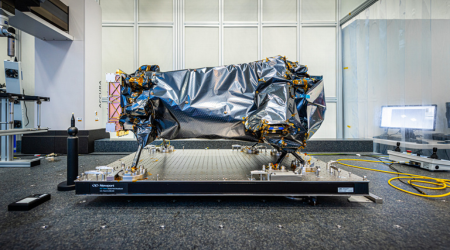Euclid Launch Seeks Answers to Universal Origins

Attribution-NonCommercial-ShareAlike 3.0 Unported (CC BY-NC-SA 3.0) (https://creativecommons.org/licenses/by-nc-sa/3.0/)
The international astronomy community is abuzz with excitement for the upcoming launch of the Euclid Satellite launch, a ground-breaking mission led by the European Space Agency (ESA) in collaboration with scientists from around the world. Scheduled for 8.11am PST on Canada Day (this Saturday, July 1, *weather permitting), this mission aims to unravel the mysteries of dark energy and dark matter, which together make up a staggering 95% of our universe.
Euclid's primary objective is to provide the most comprehensive and detailed 3D map of the dark universe ever created. It will achieve this by using cutting-edge techniques such as weak gravitational lensing and galaxy clustering to explore the distribution of matter in the cosmos. By mapping the sky using optical and near-infrared imaging and spectroscopy, Euclid may be able to provide answers to how dark energy and dark matter have influenced the expansion and formation of our universe.
Equipped with a powerful telescope and scientific instruments, Euclid will enable scientists to observe approximately one-third of the sky in extraordinary detail. This wide-field optical and infrared search from space will allow for the study of galaxies, asteroids, supernovae and black holes, as well as providing insights into star formation and the characterization of countless solar system bodies. Additionally, Euclid's observations will extend beyond our own cosmic neighborhood, facilitating the identification of extrasolar planets.
One of the most fascinating aspects of Euclid's mission is its ability to peer back in time. By capturing near-infrared wavelengths, Euclid will provide a unique view of the universe, allowing us to witness distant galaxies that formed when the universe was only 5% of its current age. These rare and ancient galaxies hold the key to understanding the origins and interactions of the first galactic structures.
Euclid's scientific mission is committed to sharing its findings with the world. With three future data releases planned throughout the survey, scientists, educators, and astronomy enthusiasts will have access to this treasure trove of knowledge. The data will pave the way for a multitude of research investigations and open doors to new discoveries in various scientific disciplines.
The Euclid Consortium (EC), a group of approximately 2500 scientists from over 15 countries, forms the backbone of this ambitious mission. Experts in theoretical physics, particle physics, astrophysics, and space astronomy have joined forces with the European Space Agency to unlock the secrets of the dark universe. Canadian researchers participating in this international consortium include PHAS faculty Douglas Scott, Allison Man and Ludo van Waerbeke.
The launch of the Euclid Satellite marks a remarkable milestone in our quest to understand and gather data about the cosmos from space. It is hoped that exploring the realms of dark energy and dark matter will provide scientists with an unprecedented glimpse into the workings of the universe.
Congratulations to the EC and international astronomy community as we celebrate this extraordinary upcoming mission!
Links:
- Euclid Consortium
- Follow the Euclid Launch live with the European Space Agency
- Euclid Consortium Press Release
- Euclid image attribution licence
- SpaceX live stream starts at 10:57am EST on Saturday, July 1, 2023
Learn More:
- UBC Euclid Launch Party: Join PHAS faculty Douglas Scott, Allison Man and Ludo van Waerbeke for the live streaming of the launch this Saturday, July 1st, from 7:30am-9:00am at the UBC campus Hennings building, in Room 200.